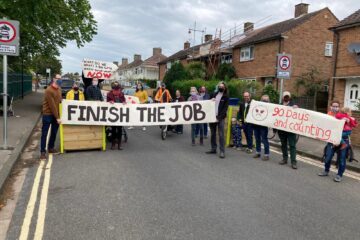Oxford is changing, and I can’t ignore it, can you?
If you are interested in the future of traffic in Oxford, and how that impacts our everyday lives, there are some important council consultations now open, for the East Oxford Low Traffic Neighbourhoods, and the Core Oxford Travel Plan. Please consider completing these online surveys by visiting this handy consultation response page – https://oxlivsts.org.uk/ltn/. Whatever your views, this is the best route we’ve got to make our voices heard.
- The traffic schemes planned for Oxford are a big deal. There is always a lot going on in Oxford, but unlike a new university building, a stadium move, a residential development, or a new shopping centre, the city traffic affects us all, every day. The county council have recently put forward significant, ambitious traffic proposals, that really could change our lives. There will be many who love or hate the schemes, many who aren’t that interested, and many who simply don’t have time to think about them. But these schemes could be so big, that we should try to understand the changes, the rationale behind them, and then let the council know our views.
- This kind of opportunity for significant, local change does not come around very often, so we should a) take time to understand the situation, and b) acknowledge that no council scheme will be perfect, but that we should consider supporting a direction of travel (no pun intended), even if the best way to get there isn’t completely clear.
- There is a real risk that the minority of polarised voices on each side of the debate will obscure the majority public feeling, and whatever your views, for all residents of Oxford this is really too big to ignore. You don’t need to join a campaign group, get involved local politics, or join a social media debate, you just need to find time to read some key information and complete a survey. The more of us that engage with this, the more the schemes will be representative of Oxfords residents.
- Plus, please consider what we might be missing out on if we remain passive on these types of issues. If we don’t show active support for things like LTNs, Quickways, bus gates etc. (because they might not be appear to be perfect solutions, or simply seem to be big changes that we are naturally sceptical about), our council will dilly-dally, and we could easily end up with another decade of inertia on traffic issues, meaning ever-increasing congestion and pollution, across the whole city.
Traffic reduction schemes can facilitate further improvements such as bus prioritization, more green spaces in our urban areas, and helping us to build-in activity into our day-to-day lives where possible.
Will you let Oxford be the city that missed the opportunity to really ‘grasp the nettle’, or will you use the consultations to make yourself heard, and send a message that we want better travel options, for everyone, across the city? You might not fully agree with them, but supporting the traffic reduction schemes is the only way to gain momentum on bigger, better improvements.
There are four choices when it comes to completing these consultations.
- If you want decisive action that will reduce congestion and pollution across Oxford, show your support for the Active Travel schemes by completing the consultations.
- If you don’t think the changes are needed, or are fundamentally the wrong way to achieve the stated goals, show your opposition by completing the consultations.
- If you are unsure, you can show your ‘support with concerns’. You may agree with the principle of traffic reduction, but have reservations about the chosen methods. It’s very important that this viewpoint is heard, as without this the council only get a sense of the feeling represented by a few vociferous groups on the edges of the debate.
- If you are completely indifferent, please still try to find time to read up about the changes, which may make you consider completing the consultation.
To summarise; if you only ever respond to a couple of local council consultations, these are the ones to set some time aside to complete. They are available on-line and in print, take about 15 minutes to complete, and are anonymous. Your response could well influence the most important changes that happen in Oxford over the next few years.
